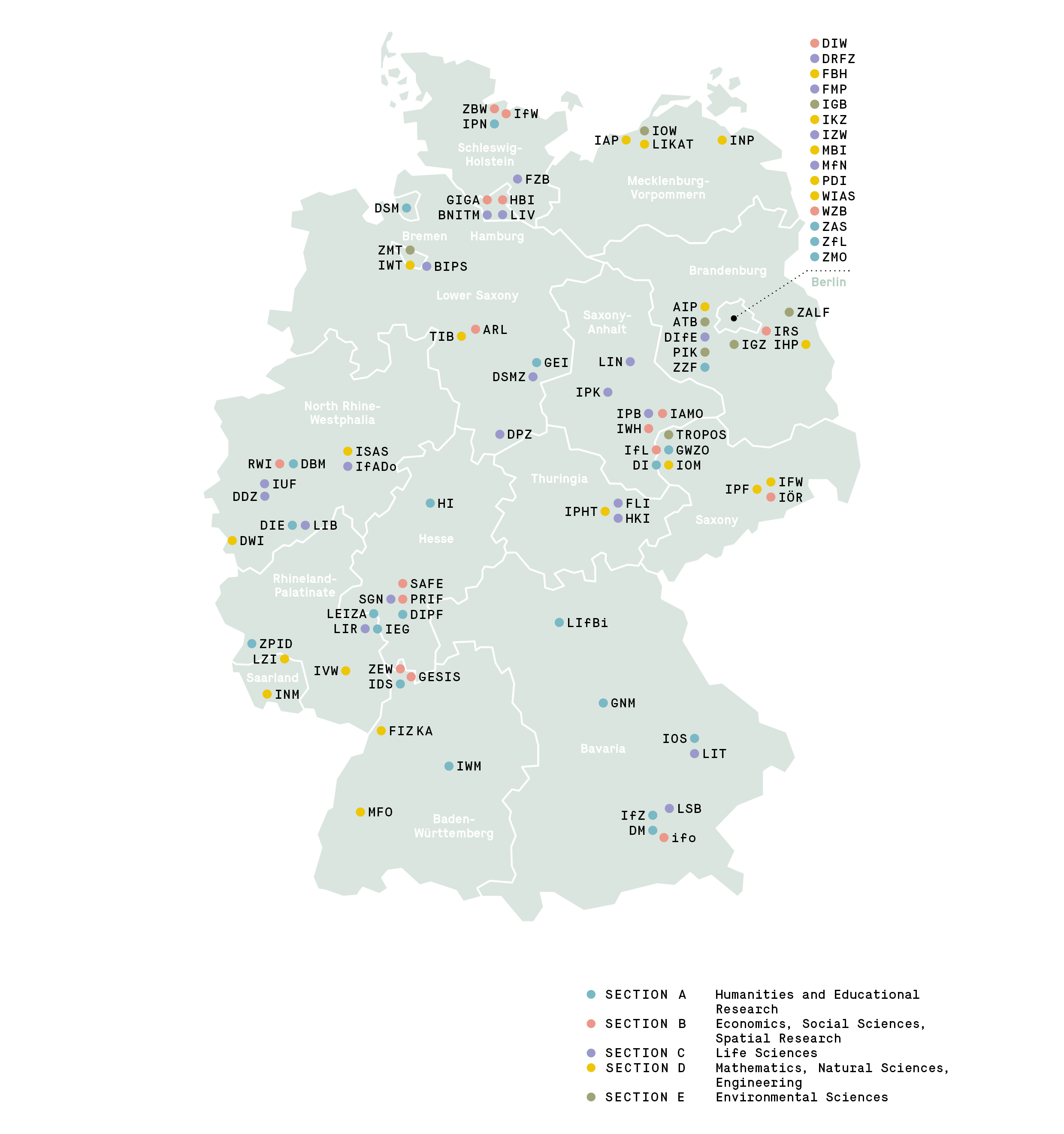
Since 2009, the Leibniz Centre for Tropical Marine Research (ZMT) is a member of the Leibniz Association funded by Federal Republic of Germany and its federal states, in particular Bremen.
Leibniz Institutes address issues of social, economic and ecological relevance. They conduct knowledge-driven and applied basic research, maintain scientific infrastructure and provide research-based services.
The Leibniz Association identifies focus areas for knowledge transfer to policy-makers, academia, business and the public. Leibniz institutions collaborate intensively with universities – in the form of “Leibniz ScienceCampi” (thematic partnerships between university and non-university research institutes), for example – as well as with industry and other partners at home and abroad.
They are subject to an independent evaluation procedure that is unparalleled in its transparency. Due to the importance of the institutions for the country as a whole, they are funded jointly by the Federation and the Länder, employing some 20,500 individuals, including 11,500 researchers. The entire budget of all the institutes is approximately 2 billion Euros.
More information: https://www.leibniz-gemeinschaft.de/en/
Within the Leibniz Association, ZMT researchers are contributing their expertise to the following sections, networks, Leibniz labs and research alliances:
Leibniz Section E - "Environmental Sciences"- Environment and Sustainable Development

The research conducted at the institutes within the section “Environmental Sciences” is geared towards a better understanding of the Earth system, in each of three domains hydrosphere, lithosphere and atmosphere. The focus is on the interfaces at which these spheres most closely intertwine with human activities, which is in the troposphere, coastal waters and shelf seas, inland waters, agricultural systems and landscapes. As a cross-sectional task research on climate impacts and climate change plays an important role within the section.

Leibniz-Labs
The Leibniz Centre for Tropical Marine Research (ZMT) is a member of one of the new Leibniz Labs, in which Leibniz institutes work together on an interdisciplinary basis and with stakeholders from society, politics and business in order to develop practical solutions for major societal challenges. ZMT is part of the Leibniz Lab "Systemic Sustainability - Biodiversity, Climate, Agriculture and Nutrition within Planetary Boundaries" to which the inistitute will contribute its interdisciplinary expertise in research on tropical coastal ecosystems from a natural and social science perspective. With the new "Leibniz Labs" format, the Leibniz Association is strengthening its interdisciplinary and transdisciplinary excellence. In a separate project, the three newly-funded Leibniz Labs will be accopanied by a special project allowing for networking and reflection in order foster knowledge for future community initiatives.
Leibniz Research Network Biodiversity
The Leibniz Research Network Biodiversity bundles and networks the expertise of 18 Leibniz institutions in the environmental, life, spatial, social, humanities and economic sciences.
The scientists at the participating institutions record and explore the biological diversity of life and develop socially relevant solutions for the protection and sustainable use of biodiversity through interdisciplinary research. Access to genetic resources and equitable benefit sharing (ABS) are also addressed. Equally, the Leibniz Biodiversity members are committed to the knowledge transfer to politics and society in order to raise awareness of the progressive loss of biodiversity and to strengthen its overall appreciation in society.
Leibniz Research Network "Environmental Crisis - Crisis Environments (CrisEn)"
The Leibniz-Research-Network “Environmental Crises – Crisis Environments” is dedicated to the research of the perception and governance of environmental changes as crisis. A key to detect a crisis and to initiate political crisis management is the perception of a threat as urgent, existential, and uncertain in its consequences. Taking this as a vantage point, the Leibniz Research Network examines under which conditions environmental change is perceived and contested as crisis, and which governance arrangements foster effective and sustainable crisis management. Both steps are important as the attribution of environmental changes as crises involves biophysical and societal phenomena whose interaction are not well understood so far. Furthermore, these two perspectives on environmental crises include furthering the resilience of contemporary societies with regard to environmental changes as well as an understanding of crisis scenarios as an opportunity for sustainability transformations.
Leibniz Research Network "Earth & Societies"
Humankind is increasingly influencing the Earth system that has evolved over millions of years. Visible signs of this "Anthropocene" are global warming, pollution of the oceans and the decline in biodiversity. In the coming years, therefore, societal decisions of civilisation-historical significance will have to be made. A fundamental question is: How can the Earth system be ecologically stabilised in such a way that well-being, prosperity, justice, peace and security for all people are secured or even achieved?Against this background, the Leibniz Research Network "Earth & Societies" has set itself the task of gaining knowledge about people in the Earth system that is relevant to society's actions. Above all, the ecological carrying capacities of the Earth system are to be determined and sustainable development paths derived from them. On the one hand, the network develops innovative principles of integrated Earth system research. On the other hand, it is investigating the oceans and their use, biodiversity, environmental migration, urban-rural relationships and the potential of the bioeconomy from the perspective of the Earth system. Climate change is considered throughout.

Leibniz Research Alliance „Knowledge for Sustainable Development"
By formulating the UN Sustainable Development Goals (SDGs) in 2015, the global community agreed on an agenda for tackling humanity's most urgent challenges. Science has a key role to play in this: it provides the basis for understanding the complex processes and develops new knowledge, technological, social and ecological innovations together with actors from politics, business and society. The Leibniz Research Network "Knowledge for Sustainable Development" supports researchers in answering the associated theoretical and methodological questions. It brings togther and connects relevant research competencies in the Leibniz Association and contributes to the effectiveness and visibility of research for sustainable development. To this end, the network organises synthesis workshops, international conferences and summer schools in cooperation with other Leibniz institutions and external partners from science and practice, as well as future dialogues with influential personalities from politics, business and society.
Leibniz Research Alliance "Advanced Materials Safety"
Advanced materials are key to the creation of innovative products and technologies ranging from catalysis, green hydrogen generation, energy storage to biomedical applications. These applications require materials which combine different nanoscopic and/or microscopic building blocks, e.g., doped and core-shell nanoparticles and high-performance fibres, into hierarchical hybrid materials. This combination of micro- and nanoscale sized building blocks as well as the compositional material heterogeneity can impose new risks during their life cycle, e.g., by decomposition into different nanoparticles, microplastic or hybrid components and subsequent release of harmful constituents. To ensure sustainable innovations, the potential risks imposed by such complex materials need to be identified and understood timely over the whole production-application cycle up to the end of their life cycle.




